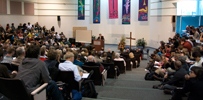Craig Gay on Technology: How Do We Tell the Good from the Bad?

We all have questions about technology. And we know the answers are complex: Should we embrace new digital technologies in spite of growing evidence that overuse can be deeply unhealthy? Or should we reject these technologies in spite of their obvious and immense benefits? Craig Gay’s new book, Modern Technology and the Human Future, enters into the complexity. Rather than offering simplistic answers to immediate questions—Is this tech good? Is this tech is bad?—Craig takes the questions to a deeper level: How does a particular technology help us become the people we were made to be? And what exactly are we meant to be?
In anticipation of his book launch and public lecture on January 23, we have asked Craig a few of our pressing technology questions. In this interview, get Craig’s take on the relationship between modern tech and capitalism, find out which piece of technology he unabashedly loves, and get insight into how to deal with your kid’s Fortnite addiction.
Is there a personal story behind your interest in theology and technology?
My primary intellectual interest has always been trying to understand where we are, what's going on, how we got here, and how does understanding these sorts of things help us to understand ourselves. As soon as you start asking these kinds of questions you can’t help but wonder about modern technology, i.e., where it came from, where it's headed, what it's doing to us, is it good or bad, etc. The fact that I grew up in Silicon Valley during the 1960s and '70s and witnessed the early years of the "digital revolution" is just a kind of happy accident, but it has given me a kind of insider's knowledge of modern tech development.
What if I think modern medicine, electric cars, and Instagram are all great? What if I love technology and think it’s basically a force for good? Should I still read Modern Technology and the Human Future?
Fair
warning: I'm going to try to talk you out of such a naive view....
It is often said that modern technology is not the problem; rather, the problem
is what we do with it. This is true as far as it goes. Technology per se—even
in its distinctively modern form—is not the real problem. What we do with
technology, however, is shaped by who in the world we think we are and by the
kind of world we believe ourselves to be living in. Here we appear to have
certain problems.
People commonly ask: What about this or that technology? Should we use it? Is
this or that technology good or bad? What we need to understand is that we
stand absolutely no chance of being able to satisfactorily answer these kinds
of questions unless we know what kinds of people we are trying to become.
Basically, unless we know where we are trying to get to, there’s no way of
knowing if this or technology is going to help us to get there.
What for you is a favourite piece of technology that furthers you toward who you want to be?
My personal favourite is my road bike, which is a kind of gallery of sophisticated technologies. As a kid I rode my bike everywhere right up through university, but then somehow left it behind as I entered adult life. But rediscovering the joys of cycling over the last 15 years has enriched my life more than any other single material addition to it that I can think of.
In the book when you talk about “the kind of world we believe ourselves to be living in,” you use the phrase “mechanical world picture” as one problematic way of viewing the world. What do you mean by that?
The tendency of modern technological development away from ordinary embodied human being is a serious problem, but a much more serious problem is that this development flows out of our own distorted understanding of what the world is as well as of our place within it. So long as we view the world simply as “stuff” and so long as we believe ourselves to be free to use the “stuff” we find in the world as we see fit, we will stand no chance of redirecting modern technology toward more humane and fruitful ends.
What does capitalism have to do with the way we use technology?
The cost-profit calculations at the heart of modern capitalism are what have driven and what will surely continue to drive modern technological development in the direction of sophisticated communications and information processing systems. Cost-profit calculations have and will surely continue to drive modern technological systems in the direction of automation. People are difficult to predict and control and they are expensive. Not only are our machines becoming increasingly good at all sorts of things, but they are also very fast and relatively cheap.
Modern technology has made so many parts of life easier. Isn’t a net reduction in human suffering a good thing?
Let me borrow a line from Andy Crouch (author of The Techwise Family). Modern technology can—as in medical and/or communications technologies—serve and even save human lives, but it does little, Crouch writes, "to form human beings in the things that make them worth serving and saving.” While modern technology is a brilliant reflection of human capacity, in other words, it actually does very little to form—and may well impede the formation of—human capacities.
[Take “Rebuilding the Household: Family & Church in the Technological Age” with Andy Crouch this summer, July 15–19.]
I recognize you’re a theologian, not a parenting self-help columnist. But what if I'm worried about my kids? They’re addicted to Fortnite and strange Youtube videos! Should I step in? But what if they hate me for it?
You should be worried about your kids. That's your job. And they won't hate you for caring about them. But get them off the screens and into the actual world of nature and human interaction. That's where real life is. That's where most real learning must happen. We need to be very wary of techniques and technologies that promise to deliver happiness and fulfillment by way of a kind of escape from embodied limitations. No! We must reply. From the point of view of the Christian religion, ordinary embodied existence has been declared good—even very good—and it is our destiny to remain fully and magnificently enfleshed within a created order that has been expressly prepared by Christ to be our home.
What are some practices I can adopt to counteract negative tendencies in my technology use?
Ask the following questions: Are our technologies really enabling us to become more of ourselves? Are they enhancing our embodied relationships with others and with the world? Or are our technologies simply doing more and more things for us, perhaps making our lives more convenient and/or more affluent, but leaving us unchanged or even diminished? The answers we give to these questions will not be the same in every circumstance, and they will vary from one person to the next. Yet if we find that we are actually being diminished by our own technologies, then we should obviously leave off using them. Spend time re-learning how to appreciate the marvel of the ordinary.
Want to go deeper? Join us for Craig's lecture and book launch on January 23. Or order the book from the Regent bookstore.




